

Epigenetics Research. Cancer Research. Whitehead Institute - Research. Research Projects - Genome Technology Center - Stanford University School of Medicine. UCSF: RNA bioinformatics. Bioinformatics touches upon every project we have in our lab.
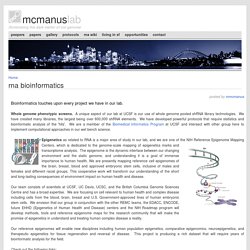
Whole genome phenotypic screens. A unique aspect of our lab at UCSF is our use of whole genome pooled shRNA library technologies. We have created many libraries, the largest being over 600,000 shRNA elements. We have developed powerful protocols that require statistics and bioinformatic analysis of the 'hits'. We are a member of the Biomedical Informatics Program at UCSF and intersect with other group here to implement computational approaches in our wet bench science. Epigenetics as related to RNA is a major area of study in our lab, and we are one of the NIH Reference Epigenome Mapping Centers, which is dedicated to the genome-scale mapping of epigenetics marks and transcriptome analysis.
Our team consists of scientists at UCSF, UC Davis, UCSC, and the British Columbia Genome Sciences Centre and has a broad expertise. Check out the following links: Epigenomics Roadmap Epigenomics. Massachusetts General Hospital. Mouse models fail to reproduce inflammatory genomic response to serious injuries Inflammatory gene expression changes are consistent in humans, no matter the injury, but not reflected in mouse models 11/Feb/2013 Existing mouse models do not appear to accurately reproduce the human genomic response to serious traumatic injury, including major burns, according to an article appearing in PNAS Early Edition.
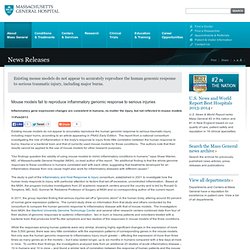
The report from a national consortium investigating the role of inflammation in the body's response to injury finds little correlation between the human response to burns, trauma or a bacterial toxin and that of currently used mouse models for those conditions. The authors note that their results cannot be applied to the use of mouse models for other research purposes.
"Our findings question the validity of using mouse models to mimic inflammatory conditions in humans," says Shaw Warren, MD, of Massachusetts General Hospital (MGH), co-lead author of the report. Schmitz Lab, genetics.uga.edu. Research Overview We are interested in determining how phenotypic plasticity and diversity are driven by natural and spontaneous epigenetic variation.
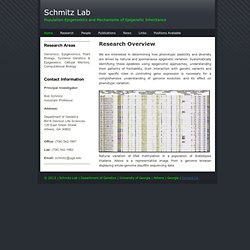
Systematically identifying these epialleles using epigenomic approaches, understanding their patterns of heritability, their interaction with genetic variants and their specific roles in controlling gene expression is necessary for a comprehensive understanding of genome evolution and its effect on phenotypic variation. Institute for Genetic Medicine Affiliated Groups, Johns Hopkins. About Centers & Departments Maps & Directions News & Publications For the Media Media Player Careers Contact Us Make a Gift Hopkins Medicine Home Patient Care Health Library Hospitals & Patient Care Locations Conditions & Treatments For Health Professionals Find a Doctor Refer a Patient Request an Appointment Pay Your Bill Search Clinical Trials Attend a Health Seminar Research Research Topics For Our Researchers Departments, Divisions & Institutes Research Centers CORE Facilities Clinical Trials Faculty Directors Events Calendar Education School of Medicine Students Faculty Residents & Fellows Health Professionals Alumni & Friends Schools Departments Apply For Admissions McKusick-Nathans Institute of Genetic Medicine Members of the IGM Clinic Appointment News Computing and Laboratory Resources Clinical Resources Affiliated Groups IGM Affiliated Groups Baltimore Huntington's Disease Center.
Research - Wellcome Trust Sanger Institute. Dr. Songtao Jia. Our laboratory is interested in epigenetic control of genome organization, which allows for heritable changes in gene function that are not due to changes in the DNA sequence.
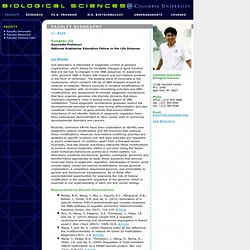
In eukaryotic cells, genomic DNA is folded with histone and non-histone proteins in the form of chromatin. The building block of chromatin is the nucleosome, which contains 146 bp of DNA wrapped around an octamer of histones. Factors involved in covalent modifications of histones, together with chromatin-remodeling activities and DNA modifications, are components of intricate epigenetic mechanisms that help organize genomes into discrete domains that plays important regulatory roles in almost every aspect of DNA metabolism. These epigenetic mechanisms gradually restrict the developmental potential of stem cells during differentiation and also constitute “memories” of gene activity that ensure faithful inheritance of cell identity. Online Mendelian Inheritance in Man (OMIM): A database of human genes, genetic diseases and disorders.
This tutorial is a part of the tutorial group Human variations.
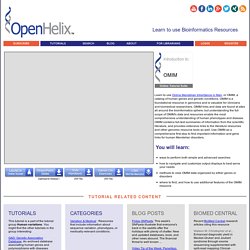
You might find the other tutorials in the group interesting: GAD: Genetic Association Database: An archived database associating human genes and polymorphisms with diseases Madeline 2.0: Human pedigree diagram tools DrugBank: A chemoinformatics and bioinformatics resource DGV: Database of Genomic Variants: Database of Genomic Variants, DGV, catalogs and displays structural variation in the human genome CGAP: Characterize the molecular genetic changes that cause a normal cell to become a cancer cell. Genetics — News Room - UNC Health Care. Evans co-authors commentary in JAMA UNC Lineberger Comprehensive Cancer Center member Jim Evans, MD, PhD, Bryson Distinguished Professor of Genetics and Medicine and director of clinical cancer genetics, has co-authored a commentary in the Journal of the American Medical Association (JAMA) on proposed US Food and Drug Administration (FDA) regulation of genetic testing.
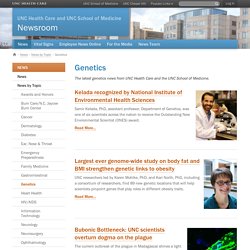
The Geneticist With his selection to the NIH Council of Councils, Terry Magnuson, PhD, becomes the first UNC scientist appointed to the board dedicated to funding the biggest ideas in medical research. Solving Cancer’s Secrets Five questions for Chuck Perou, PhD, a UNC geneticist on the hunt for better treatments for the most deadly form of breast cancer.